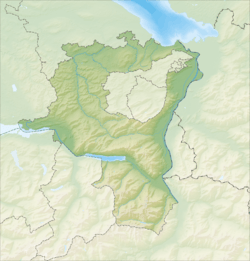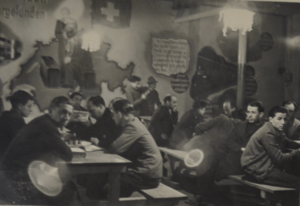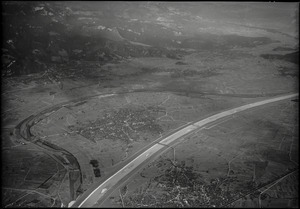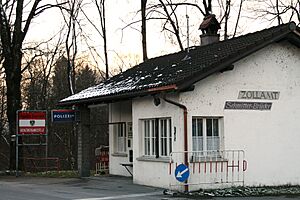Diepoldsau facts for kids
Quick facts for kids
Diepoldsau
|
||
|---|---|---|
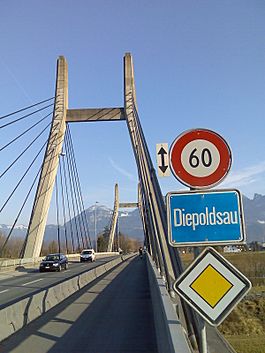 |
||
|
||
| Country | Switzerland | |
| Canton | St. Gallen | |
| District | Rheintal | |
| Area | ||
| • Total | 11.25 km2 (4.34 sq mi) | |
| Elevation | 408 m (1,339 ft) | |
| Population
(Dec 2020 )
|
||
| • Total | 6,479 | |
| • Density | 575.91/km2 (1,491.6/sq mi) | |
| Postal code |
9444
|
|
| Surrounded by | Altach (AT-8), Balgach, Hohenems (AT-8), Lustenau (AT-8), Oberriet, Widnau | |
Diepoldsau is a small town, also called a municipality, in Switzerland. It is located in the canton of St. Gallen. Diepoldsau is part of the Rheintal area.
Contents
History of Diepoldsau
Diepoldsau was first written about in the year 891. Back then, it was called Thiotpoldesouua. Another part of the town, Schmitter, was first mentioned in 1385.
During World War II, Diepoldsau became a very important place. It was a crossing point for many Jewish people trying to escape from Nazi Germany. They were seeking safety in the St. Gallen area of Switzerland.
Thousands of Jewish people found safety here. This happened even though Switzerland had strict rules about who could enter the country at that time.
In 1938, a special camp for refugees was set up in an old factory. The Swiss Red Cross helped to run this camp. Money for the camp came from the Jewish community in St. Gallen. The Swiss government did not help pay for it.
People in the camp were not allowed to find jobs. They were also checked often by the police.
Geography of Diepoldsau
Diepoldsau covers an area of about 11.2 square kilometers (4.3 square miles). A large part of this land, about 67%, is used for farming. About 4% is covered by forests.
Around 20% of the land has buildings or roads. The rest, about 8.5%, is made up of rivers or lakes.
The town is right on the border with Austria. It includes the villages of Diepoldsau and Schmitter. These villages are located along the old Rhein river.
Diepoldsau's Coat of Arms
A coat of arms is a special symbol for a town or family. Diepoldsau's coat of arms has a green background. On it, you can see two golden ears of corn. At the bottom, there is a wavy silver line. This line likely represents a river.
People in Diepoldsau
Diepoldsau has a population of about 6,800 people. Around 20% of the people living here are from other countries. Many of these people are from Germany, Italy, Austria, and countries that used to be part of Yugoslavia.
Most people in Diepoldsau speak German. Albanian is the second most common language, followed by Italian.
The town has a good mix of ages. About 14% of the people are children aged 0-9 years old. Another 14% are teenagers aged 10-19. The rest are adults and seniors.
Many people in Diepoldsau live in families with children. Some live alone, and others live as couples without children.
Most people in Switzerland have a good education. In Diepoldsau, about 69% of adults have finished high school or gone on to college.
Here is how the population of Diepoldsau has changed over time:
| year | population |
|---|---|
| 1798 | Diepoldsau 673, Schmitter 472 |
| 1850 | 2,586 |
| 1880 | 3,167 |
| 1888 | 2,014 |
| 1900 | 2,129 |
| 1910 | 2,804 |
| 1950 | 2,954 |
| 2000 | 5,034 |
Economy of Diepoldsau
Diepoldsau has a healthy economy with many different jobs.
- Farming (Primary Sector): About 160 people work in farming. This includes growing crops and raising animals. There are about 35 farming businesses.
- Factories and Production (Secondary Sector): Many people, about 1,760, work in factories or making things. There are over 100 businesses in this area.
- Services (Tertiary Sector): About 859 people work in service jobs. This includes things like shops, banks, and healthcare. There are about 180 service businesses.
Many people who live in Diepoldsau also work in the town. Others travel to nearby towns for work. Many people also come into Diepoldsau to work from other places.
Religion in Diepoldsau
Most people in Diepoldsau are Christian. About 57% are Roman Catholic. Another 26% belong to the Swiss Reformed Church.
There are also smaller groups of people who follow other Christian churches, the Orthodox Church, and Islam. A very small number of people are Jewish. Some people do not belong to any church.
Trivia
Diepoldsau was one of the places where the Swiss-Austrian movie Akte Grüninger was filmed. This movie tells a true story.
See also
 In Spanish: Diepoldsau para niños
In Spanish: Diepoldsau para niños
 | Delilah Pierce |
 | Gordon Parks |
 | Augusta Savage |
 | Charles Ethan Porter |




